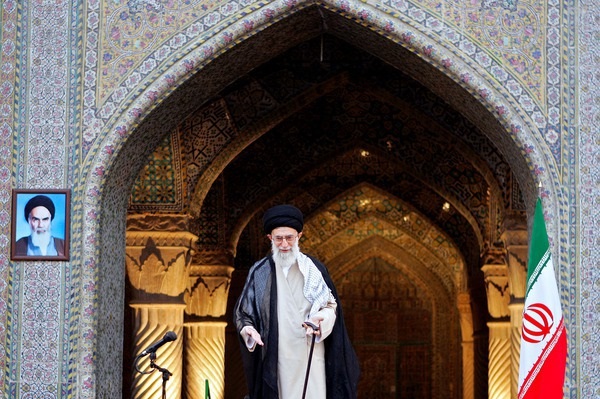Is Iran’s Supreme Leader near death? Why the answer is supremely important
By Judith Miller
By khamenei.ir – http://farsi.khamenei.ir/photo-album?id=29866, CC BY 4.0, https://commons.wikimedia.org/w/index.php?curid=51039114
Could Iranian Supreme Leader Ayatollah Ali Khamenei be near death? American and Israeli Intelligence analysts have been debating the state of the Iranian political and spiritual leader’s health since Khamenei posted a tweet Wednesday asking supporters to pray for him.
The tweet – “I ask all of you dear ones to pray for me” – appeared on “Khameneil.ir,” a Twitter site in English closely followed by Iran watchers and viewed as more or less official.
The tweet has also sparked speculation about what it means for the Biden administration’s effort to revive and strengthen the 2015 Iran nuclear pact, the arms control agreement with Iran which Donald Trump unilaterally abandoned exactly three years ago Saturday. The speculation also coincides with the opening in Vienna of a fourth round of talks in Vienna Saturday over Biden’s efforts to return to that agreement.
Arms control sources close to the talks said that the two sides were close to a deal and were optimistic that remaining differences over Iranian demands that sanctions be removed immediately and Iran’s recent actions to speed its nuclear program beyond limits permitted by the agreement could be overcome.
IRAN NUCLEAR DEAL: HIGH-LEVEL TALKS RESUME ON US RETURNING
Israel, which is adamantly opposed to the nuclear deal, fears that too. Israeli sources confirmed a report in Foreign Policy by John Hannah, a national security adviser to former Vice President Dick Cheney, that senior Israeli officials were now convinced after meetings in Washington that the Biden administration was prepared to offer Iran what it wants to restore the nuclear deal that slowed the Iranian nuclear program but they saw as deeply flawed.
Hannah reported that a senior delegation of Israeli officials who met with their White House counterparts (and also with President Biden) concluded after their own talks that Biden would give Iran billions of dollars in sanctions relief without first fixing the nuclear deal’s flaws – which include, in their view, letting Iran proceed with an advanced centrifuge program in 2023 and without enhanced verification of Iran’s compliance with the deal.
Although Trump’s withdrawal from the nuclear deal, expanded sanction, and policy of “maximum pressure” on Teheran failed to stop Iranian repression at home or aggression abroad, the Israelis have concluded that returning to the nuclear deal without strengthening it might well “mark the moment that the countdown to a new war in the Middle East began,” Hannah wrote.
He noted that Israel’s embattled Prime Minister Benjamin Netanyahu and other senior Israeli officials have warned Washington repeatedly that Israel will not permit Iran to build an atomic bomb, which they believe poses an existential threat to Israel and its security.
However, a senior Biden administration official who briefed reporters on the status of the Vienna talks Thursday struck a more cautious tone about an agreement’s prospects.
He downplayed the likelihood that an agreement was imminent, saying that the outcome depended on Teheran.
“Is it possible that we’ll see a mutual return to compliance in the next few weeks, or an understanding of a mutual return to compliance? It’s possible, yes. Is it likely? Only time will tell,” he said.
Which brings us back to the significance of Khamenei’s tweet. Patrick Clawson, director of research at the Washington Institute for Near East Policy, said that it was hard to know whether Iran’s supreme leader would approve whatever deal his team in Vienna managed to negotiate.
“Khamenei could always pull the plug,” he said, adding that the supreme leader had done so before in an earlier deal negotiated but abandoned in 2009. “It’s the Supreme Leader who matters, not the negotiators,” he said, which may account for the U.S. team’s caution.
For despite all the time and money spent on efforts to figure out what Khamenei is thinking and even the state of his health, Washington knows far too little for certain about such vital internal Iranian matters.
Rumors that Khamenei is gravely ill have circulated for years, said Clawson and another WINEP researcher, Omer Carmi. Seen in context, Carmi argues, the tweet is more religious than political in that the “pray for me” appeal was issued on Qadr Night at the peak of Ramadan, the Muslim holy month of dusk to dawn fasting. Iranians and other Shiite Muslims believe that Qadr Night is when God decides a man’s fate for the year and thus, when the Almighty is particularly responsive to an individual’s prayers.
The tweet without this context was apparently deleted, only to be reposted with a hashtag for “Qadr Night,” so that people would understand its religious context. But some American and Israeli analysts nonetheless concluded that the tweet referred to a deterioration in Khamenei’s health.
The bottom line, Carmi wrote in an email, is that “an intern in Khamenei’s office will get fired.”
Originally published in Fox News

